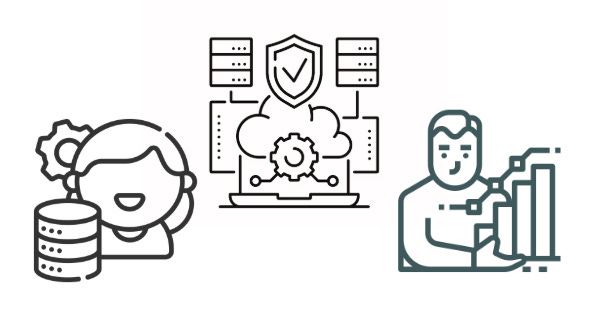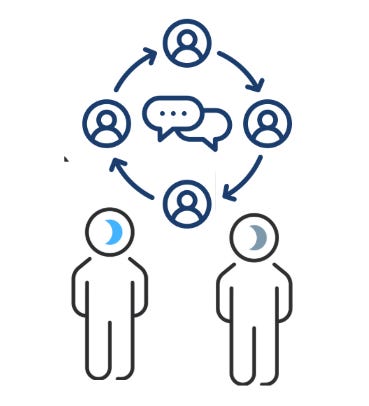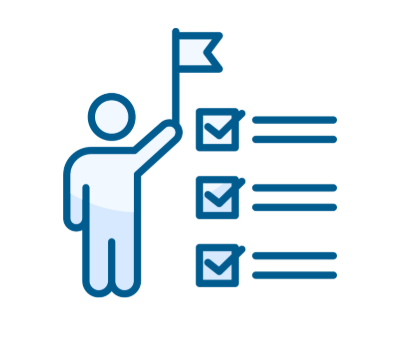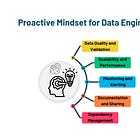Stop Being the Invisible Data Engineer: 8 Strategies for Career Success
Practical tips to grow our impact, visibility, and career as a data engineer.
Data engineering has rapidly become one of the most crucial roles in today’s technology landscape. Yet, many data engineers find themselves in a puzzling situation: despite powering the core of business operations, they often feel invisible and undervalued.
Unlike software engineers, whose features directly impact users, or product managers whose decisions shape user experience, data engineers operate behind the scenes, building the critical infrastructure that powers everything else.
This invisibility creates a self-defeating cycle:
Stakeholders don’t fully understand what data engineers do, so they can’t appreciate their value.
I remember when I first joined the company, a Business Analyst asked me, “What exactly is your job?”
Without appreciation, data engineers are excluded from strategic conversations.
Without a seat at the table, proving impact and gaining recognition becomes even harder.
Most data engineers describe their work in technical terms: “I built a pipeline processing 5TB of data daily,” or “I optimised ELT jobs to run 50% faster.” While impressive technically, these statements rarely resonate with business leaders who care about outcomes, not just outputs.
In this post, we share how Data Engineers can achieve greater career success by focusing on key skills beyond coding, including:
Mastering the art of business translation.
Becoming a strategic communicator and compelling storyteller.
Building strong cross-functional relationships across the organisation.
Focusing on solving the right problems, not just technical ones.
Mastering the art of Strategic Pushback.
Developing leadership skills regardless of our current role.
Choosing our career path strategically.
Committing to continuous learning and growth.
1. Master the Art of Business Translation
Success starts with translating technical achievements into a clear business impact. Great data engineers don’t just build systems; they solve business problems and communicate their value effectively.
Instead of saying:
“I implemented a real-time streaming architecture using Kafka and Spark.”
Try saying:
“I built a system that reduces customer churn by 15% by enabling marketing to engage at-risk customers within minutes instead of days.”
This translation requires a deep understanding of the business context behind your work. Every pipeline you build, every optimisation you make, and every data quality fix you apply should directly relate to measurable business outcomes, whether that’s driving revenue, cutting costs, or improving customer satisfaction. When we connect our technical work to business value, we shift from being a cost centre to a value creator.
2. Become a Strategic Communicator and Storyteller
Technical skill alone isn’t enough. The best data engineers tell compelling stories about their work and its impact by:
Adapting to the audience and Be Ready to Pivot: Speak to executives in terms of business metrics, talk to product managers about user experience, and dive into technical details with engineers. Start with a functional approach, but be prepared to adjust if the conversation shifts towards technical information:
Example: You're presenting the new data pipeline you built.
To Executives:
“This reduced report delivery time from 12 hours to 10 minutes, helping us make faster business decisions.”To Product Managers:
“Now your team can access live usage data to understand feature adoption better.”To Engineers:
“We implemented Spark for parallel processing and optimised joins to handle 10x more data.”
If you want to learn how to communicate effectively as a data engineer with different stakeholders, check out this short post:
Using data-driven storytelling: Build dashboards showing before-and-after metrics, track KPIs influenced by our systems, and document success stories.
Example: You optimised a data pipeline that feeds a financial dashboard.
You show:
Before: Reports ran at 8 AM, finished at 10 AM.
After: Reports are done by 7:30 AM.
Then you say:
“Because of this, finance can close the books 2 hours earlier every month-end.”
You can even include a quote from the finance lead to add weight.
Communicating proactively: Don’t wait for recognition. To raise your visibility, regularly share project updates, business impacts, and future plans through meetings, emails, or one-on-ones.
Example: You led a cost-optimisation initiative in BigQuery.
You email the team:
“This change reduced query costs by $3K/month. Next, we’re targeting the data warehouse cleanup.”
We can also mention it during a team meeting and offer a walkthrough session for anyone curious.
3. Build Strategic Relationships Across the Organisation
Data engineering is inherently cross-functional. Success depends on strong partnerships with data scientists, product managers, analysts, and business stakeholders.
One-on-ones matter: Regular check-ins with stakeholders help you understand challenges, gather requirements, and build trust.
Show up in cross-functional meetings: Your presence in product reviews and business discussions signals data engineering’s importance.
Network internally: Cultivate relationships across roles and levels to gain support, insight into priorities, and new career opportunities.
Curious about who shapes the work of a Data Engineer? Check out Essential Data Engineering Stakeholders: The Roles That Shape Your Work1 by Yordan Ivanov
4. Focus on Solving the Right Problems
The key to success is developing a strong understanding of the business to identify and address the most important problems.
Adopt a business-first mindset: Before building, ask ourselves: What problem are we solving? How will we measure success? What are the consequences of not acting?
Prioritise wisely: Not every technical challenge deserves our time. Focus on those that deliver the greatest business impact and align with company goals.
Measure outcomes: True success isn’t just about technical excellence, it’s about the real value our work creates for the business.
5. Master the Art of Strategic Pushback
Saying "yes" to every request leads to burnout, technical debt, and misaligned priorities. Successful data engineers learn to say “no” strategically.
Why push back? It builds credibility by protecting the organisation from unrealistic timelines or poor technical choices.
How to push back effectively:
Offer alternatives.
Explain risks and trade-offs clearly.
Frame objections in terms of business impact.
For example:
“Given our current architecture, delivering this in two weeks would compromise data quality and impact recommendation accuracy. I can deliver a robust solution in six weeks or a basic one in two. Which aligns better with our business goals?”
6. Develop Leadership Skills Regardless of Role
Leadership isn’t limited to managers. Successful data engineers show leadership by:
Taking ownership of system architecture and setting high technical standards.
Sharing knowledge through presentations, writing, and mentoring others.
Leading cross-team projects, such as data governance or quality initiatives.
These actions establish us as trusted technical experts and thought leaders, opening doors for career growth and greater influence.
7. Commit to Continuous Learning
Fundamentals first:
Focus on mastering core concepts first. New tools come and go, but strong fundamentals will always help you grow and adapt.
Meetups & Conferences:
Attending local or virtual meetups and conferences is a powerful way to deepen your data engineering knowledge. These events provide valuable networking opportunities, showcase the latest tools, and offer real-world insights into the challenges and solutions shaping the industry. Presentations often highlight current data architectures and innovative practices, giving you practical exposure.
Social Platforms:
Leverage platforms like LinkedIn, Substack, and others to follow thought leaders and pioneers in data engineering. By connecting with experts and learning from their experiences, you’ll stay up-to-date on emerging tools, industry trends, and the technologies companies are adopting, keeping your skills sharp and relevant.
8. Choose Our Career Path Strategically
As a data engineer, our work can significantly shape our career growth. Whether we choose a startup or a large enterprise, the environment will impact our skillset, visibility, and long-term opportunities.
Startups Offer:
Broad exposure: we’ll touch many parts of the data stack, from creating pipelines, infrastructure, analytics, and maybe even DevOps.
Direct business impact: Our work is often closely tied to real-time business decisions.
Faster execution: Less bureaucracy means ideas get implemented quickly.
Equity upside: We might get a stake in the company’s success.
But they also come with:
Resource constraints, we need to be ready to wear many hats.
Less structured career progression.
Large Companies Offer:
Structured mentorship: More opportunities to learn from experienced peers.
Defined career ladders: Clear roles, promotions, and performance expectations.
Specialisation: we’ll go deeper into specific technologies at scale.
That said, this isn’t a one-size-fits-all situation.
Many factors influence the experience, like whether it’s a greenfield or legacy project, the size and maturity of the team, company culture, and our own career goals.
Choose thoughtfully. Your path is your own.
Conclusion
Data engineers aren't just builders, they're business enablers. To grow our impact and careers, we must go beyond code: speak the language of the business, build strong relationships, and lead with clarity. When we tie our work to real outcomes, we stop being invisible and start becoming indispensable.
If you're keen to learn how to become a highly effective engineer, check out 5 Habits of Highly Effective Data Engineers to Master in 2025 2 by SeattleDataGuy.
Want to learn how to think beyond data pipelines and stay ahead of data challenges? Check out this post:
Looking to transition into a data engineering role from other data positions? Check out these two helpful posts:
We Value Your Feedback
If you have any feedback, suggestions, or additional topics you’d like us to cover, please share them with us. We’d love to hear from you!
https://www.datagibberish.com/p/essential-data-engineering-stakeholders
https://seattledataguy.substack.com/p/5-habits-of-highly-effective-data














Insightful